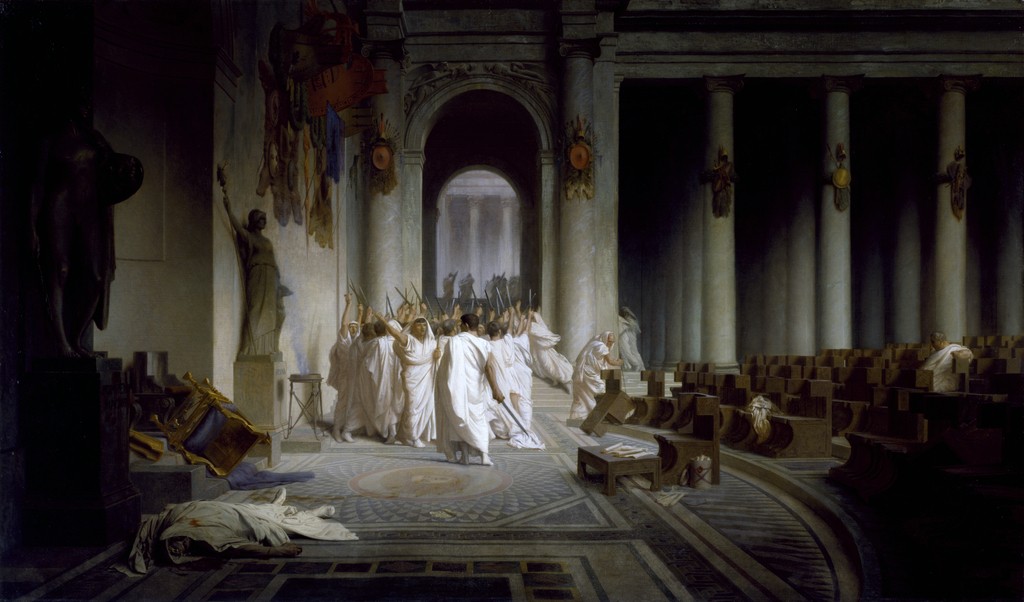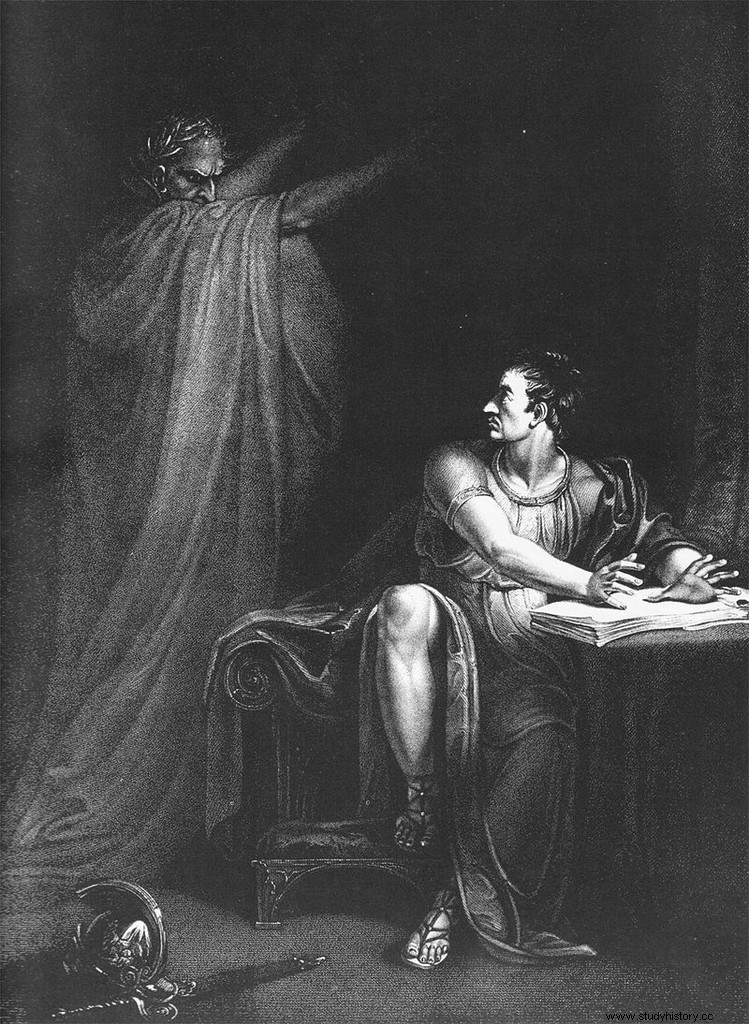
It seems that Brutus is the main culprit in the assassination of Caesar, probably due to Shakespeare's influence, but in reality, Casius is the main culprit.
As for the area around Caesar, I have the impression that Shakespeare has distorted it a lot. Shakespeare, who dyes even his historical view in his own color, is a big deal, but later, famous critic Bernard Shaw told him that Shakespeare didn't know Caesar. Caesar aside, Pompey looks sorry for that.
But Shakespeare was before Edward Gibbon and of course Mommsen. I think he can't help because he's from an era like the internet. He wasn't studying history, he was writing interesting plays.
And there are actually two Brutus who participated in the assassination of Caesar.
I think few people know this, but it is said that there were about 40 Caesar assassins, two of whom were named Brutus.
One is Marcus Junius Brutus, the son of Servia, a lifelong mistress of Caesar.
The other is Decimus Unius Brutus Albinus, who Caesar was trying to take over if Octavian couldn't succeed him for some reason.
It is said that Caesar said "Brutus, you too!" Brute was from Decimus, but he did not appear in Shakespeare's Julius Caesar. In a sense, that may be kinder as a play.
So let's take a look at the two Brutus this time!
Decimus Unius Brutus Albinus
Let's start with Brutus, who is Dekimus.
He is a distant relative of Caesar, and his father of the same name was a consul in 77 BC.
Caesar seemed to like it a lot, and he also served on the Gallic expedition, with some military achievements. Caesar's reputation was fair and solid, so he would have been talented enough to make a name for himself as a candidate for his successor. Caesar's right-hand man, Antonius, wasn't a candidate for his successor, and his son, Caesarion, wasn't even in his will.
That's why I was surprised that Decimus was in the assassination team.
The motive for his involvement in the assassination of Caesar is unknown, but there is a strong theory that he was invited by his cousin Marcus Brutus to participate. Since Rome became independent of the royal system, the citizens have placed the highest priority on giving life to the republic.
So the Scipio trial happened, and the assassination of Caesar happened.
The Roman dictator's term was six months, and Sulla, who became a lifelong dictator, soon left his position.
Despite admiring Caesar, who became a lifelong dictator and tyranny like a king, like his father, Dekimus participated in the assassination.
Later, when he learned of Caesar's will, Dekimus was shocked. Or perhaps the motive for Caesar's assassination was that he thought he wasn't fully recognized.
Alas, it was Antonius, not Decimus, who wasn't recognized ...
After the assassination of Caesar, he was devoted to the fight against the Caesar faction, and was defeated by the Allied Forces of Antonius and Lepidus, and was killed on the way.
Caesar was so popular that the assassins had no place to rest.
Marcus Junius Brutus

Caesar was known by the nickname of lewd baldness during his lifetime. He laughs because Caesar himself was pleased with it, but he seems to have had no moderation, and there is even a story that one in three of the wives of the Senator was Caesar's mistress.
In fact, the wives of Pompey and Crassus, who both politicized, were also Caesar's mistresses.
Caesar's best mistress was Marcus Brutus' mother, Servia. Therefore, Caesar was rarely given preferential treatment to Marx regardless of his ability.
Marx himself was one of the most prestigious Romans, a descendant of Lucius Junius Brutus, who is said to be the founder of the republic, and a member of the Senate of the congregation. He also married Polkia, the daughter of Little Caesar, who hated Caesar, and took anti-Caesar actions throughout his life.
Marcus Brutus is also famous as a moneylender, and he lent out a loan shark with an annual interest rate of 48% at a deep blue interest rate and bought a sword from Kikero and others.
He was such a human being, so it wasn't very popular as a matter of course, but Caesar, who had no son, said he loved Marx like his true son.
However, from Marx's point of view, he was the one who took his mother, so there may have been an Oedipus complex for Caesar. In a sense, the assassination of Caesar is equivalent to the murder of his father in psychological terms.
Marx himself seems to have hated Caesar for a long time, and he is fighting for Pompey in the Battle of Pharsalus. At that time, Caesar had informed all his soldiers not to hurt only Brutus, so the preferential treatment would have been considerable.
Caesar, who is more likely to live or die, or who is more likely to die, thinks that Caesar is a big man, but Marx probably didn't.
Caesar forgave and hugged Marx, who was hostile to him, and even recommended him to Praetor.
But Marcus Brutus killed Caesar.
"The despot is like this"
That said, he was brutally committed.
Dante, who later played an active part in the Renaissance, betrayed Jesus in his masterpiece "Divine Comedy," either because he had a republican ancestor, or because he had a grudge against his mother. Along with Judas and Casius, the perpetrator, he is portrayed as being punished by Satan for being bitten by Satan as one of the three major betrayal villains in history.
Even in posterity, it was like this, so the momentum for Brutus to die was widespread among Roman citizens.
He wasn't killed immediately because he was frightened by the lack of his name in the will and teamed up with Antonius to counter his legitimate successor, Octavianus. When the Triumvirate began, the "Pedius Law" was enacted, and the Caesar assassin could be sentenced to death without a trial.
Marx fled the vast Rome, imposed heavy taxes on Greece by force, organized a corps of 100,000, and met Cassius with the Second Triumvirate in Philippi (Battle of Philippi).
Antonius fought Cassius, Octavian and his lieutenant Agrippa fought Brutus, and Brutus won, but Cassius was defeated and killed.
Brutus, who realized that he had never lived, lost his energy to live and ended up committing suicide.
The end of the traitor, east and west, is empty.
